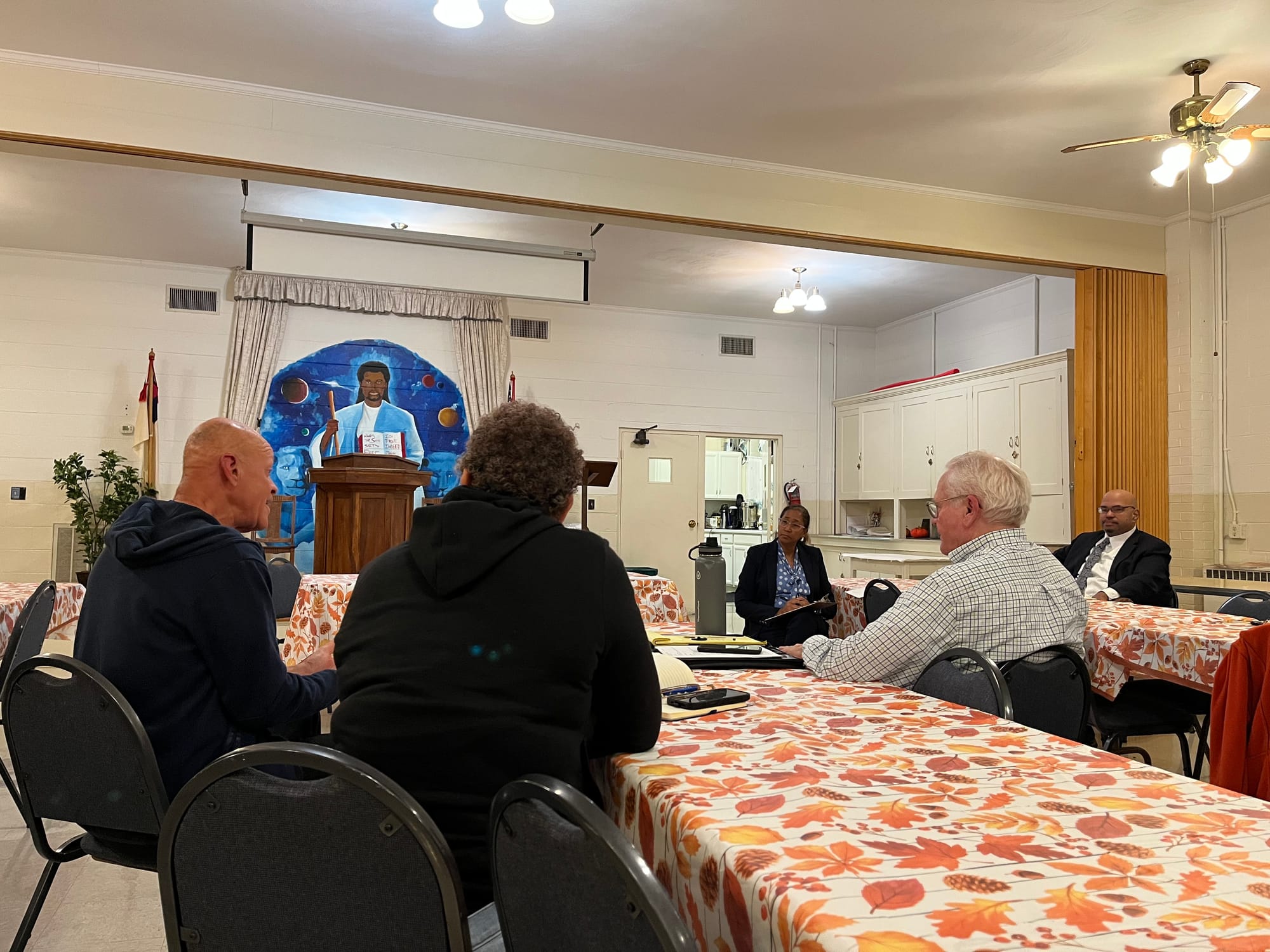Urban Renewal Apology Moves Closer to City Council Decision
After three community meetings, Roanoke's Equity and Empowerment Advisory Board will take its recommendations to city council.

As the sun set over Williams Memorial Baptist Church on Thursday evening, Roanoke’s Equity and Empowerment Advisory Board moved one day closer to achieving a goal set nearly two years ago: city council approving a public apology for urban renewal.
Last week’s meeting marked the board’s final community listening session of the year, concluding a series of three meetings designed to gather community input on how the city should address the decades of damage it inflicted upon the Black community through urban renewal.
After early concerns about low attendance, the last two meetings saw a boost in participation, providing the board with detailed community feedback on what would be a historic apology.
Between the 1950s and 1970s, the city’s urban renewal policies cleared the way for new development by upending thousands of lives — demolishing hundreds of Black homes, businesses, churches and schools in Gainsboro and northeast Roanoke.
In her closing remarks, board Chair Angela Penn thanked participants for their contributions, while looking ahead to the next step: presenting their ideas to the council, which is scheduled for Dec. 16.
“We know that the subject matter is difficult and can bring up lots of things that maybe you haven’t thought about in a while,” she told the attendees. “We really appreciate and respect your willingness to have this conversation and we will be good stewards of the information that you have shared with us.”
At the December meeting, the EEAB plans to share a report of the community’s ideas and requests with the council. That same day, the board will also deliver a revised draft of the urban renewal apology — putting the next move on the historic apology in council’s hands.
After challenges, apology gains momentum
In the nearly two years since the council first tasked the EEAB with developing the apology draft, progress has been slowed by a series of challenges, including board turnover and time spent addressing a controversy surrounding the city’s approach to the Evans Spring development plan.
But the board gained new momentum in September when it voted to present an abbreviated version of the apology draft to council. The apology outlines the history of urban renewal and acknowledges the lasting harm done to Roanoke’s Black community.
The board has also been impacted by limited visibility. EEAB references were removed from the city’s website earlier this year following President Donald Trump’s executive order, “Ending Radical and Wasteful Government DEI Programs and Preferencing.” Afraid it could lose millions in federal housing dollars, the city complied with the executive order by removing diversity, equity and inclusion language from its webpages.
After the scrubbing, EEAB meetings were no longer advertised online by the city. The city did not publicize the board's first community feedback session on Sept. 27, which only three residents attended.
Afterward, Penn said the board members asked the city for help promoting the remaining meetings. “We [all] recognized that we needed to use all avenues to communicate about the upcoming meeting,” she wrote in an email.
In October, the city’s Facebook page shared a post promoting the two remaining sessions. The information was also circulated by the Roanoke Tribune and local artist Jane Gabrielle, whose poster advertising the meetings was also shared on social media.
Attendance grew to about 24 total participants across the last two sessions, and Penn said she collected additional feedback from a Northwest community roundtable in October.
Across the meetings, community members offered a range of suggestions for how the city might take action, including:
- Establishing economic resources to address the lasting financial damages of urban renewal.
- Installing historical markers at significant landmarks to honor displaced communities.
- Incorporating local urban renewal history into Roanoke City Public Schools’ curriculum.
A historic step
If approved by the council, the public apology would mark a historic milestone. Few cities across the country have issued formal apologies for urban renewal, and fewer still have passed reparative measures for Black residents.
One notable example is Evanston, Illinois, which became the first American city to offer reparations to Black residents in 2021. Evanston’s approach, which offers payments to Black residents affected by discriminatory zoning from 1919 to 1969, was cited by participants on Thursday as a potential model for Roanoke.
If and when the council will vote on the apology remains unclear. As part of the EEAB’s presentation, Penn said the board plans to ask when a date for a vote will be set.
City Councilman and former EEAB member Phazhon Nash noted that while the feedback sessions “weren’t heavily attended,” he is eager to hear the community’s input and review the board’s recommendations ahead of a potential vote.
“I want to see what their recommended actions are,” he said. “I think whatever it is is going to be quite interesting, and then I’ll make a decision based off of that. But I don’t know yet. I’ve got to see what they got.”

